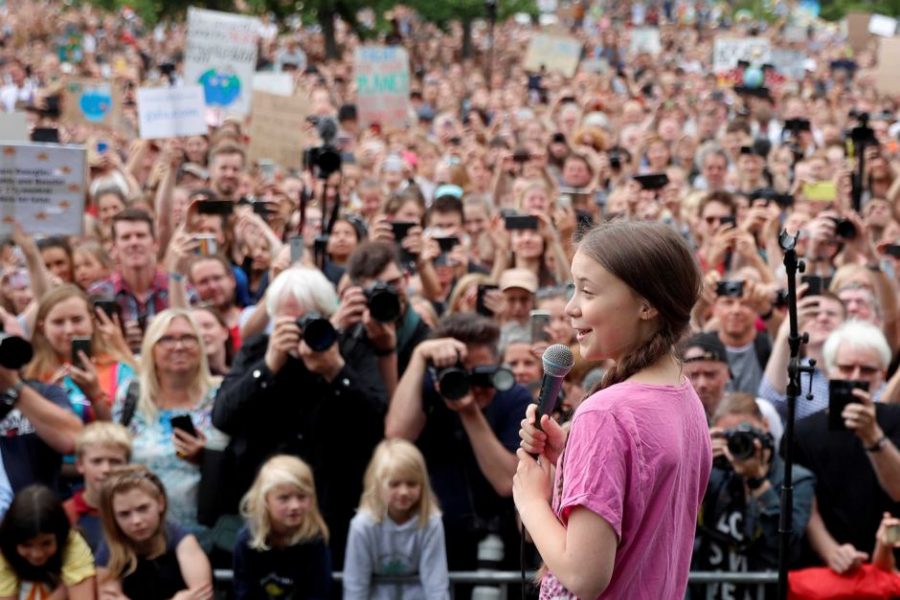TIME’s 2019 “Person of the Year,” winner of a 1.25 million dollar humanitarian prize, speaker at the United Nations Climate Action Summit along with the World Economic Forum both in the same year. Shockingly, all of these fantastic and monumental achievements were accomplished before Ms. Greta Thunberg reached the age of 18. This renders her a child, a youth, a juvenile. Few like to believe in the sheer power that young people possess in today’s society, but Greta Thunberg and many others like her have shown the world just how powerful youth can truly be.
Often, innovative youth run into many people who have adopted the “you’re only a child” mindset. A mindset that is so toxic and detrimental that its entire purpose is to keep out young people’s innovative ideas, solely based on their age. This mindset is precisely the type of thing that needs to be dismantled if people hope to reverse climate change, see true human equality, and, honestly, achieve anything significant in the world today.
Children today are capable of making extreme changes to society around them, but only if they could be adequately encouraged. Instead, they are told that they are unfit to have such ingenious ideas because of their age. Who’s to say that a child’s vision is less important than an adult’s? Especially if that child could bring fresh or creative thoughts to a table filled with thoughts dulled by the tests of time.
Take a look at the aforementioned Greta Thunberg. Thunberg has made monumental strides in the climate change reversal cause. Thunberg started her, now widespread, movement at the ripe, young age of 15. She started by striking from school, an action that is still current today, and built her way up to traveling the world, warning global leaders of the dangers of climate change inaction. Thunberg has never let her age stand in her way; in fact, she rarely even addresses it. She often makes comments referring to herself as a child, but past that, she acts as though there is no difference between herself and any world leaders alongside her in the conferences. In fact, one of Thunberg’s more notable mottos is…
“I’ve learnt that no one is too small to make a difference.”

The mindset that Thunberg has adopted is exactly what the rest of the world needs to adopt. Instead of dwelling on age and letting it limit youth, pretend as though every idea comes from the same, well-equipped mind.
So how can it be ensured that passionate and innovative children get encouraged to reach their full potentials? According to Tony Wagner, an innovative education fellow at Harvard University, the main aspects of encouraging children to be innovative and creative are play, curiosity, passion, fearlessness, and purpose. Wagner believes that the key to raising inventive youth is within these five critical areas.
Wagner thinks that for children to want to be creative thinkers, they must find learning fun. This is the aspect of play that is crucial in raising cutting edge kids. Next, Wagner claims that following the cliche “curiosity is key” is another significant step in raising children eager to test the limits. “The average child asks 100 questions a day,” he says. “But by the time a child is 10 or 12, he or she has figured out that it’s much more important to get right answers than to keep asking thoughtful questions.” Discouraging youth curiosity is one of the earliest and easiest ways to dim the imaginative light in their brains.
Passion is the most challenging part of Wagner’s five aspects of innovation in youth. Hundreds of the most successful innovators have highlighted the importance of the link between their passion and their success. This is harder for children because passion cannot be taught, only encouraged once it is found. Nevertheless, it is still vital for youth to recognize their passions and for the adults in their life not to discourage their passions.
Lastly is fearlessness and purpose. Wagner claims that these two aspects often go hand-in-hand because both require time and practice. To become fearless requires much effort and can be taught when youth are educated without being told to fear failure or growth. Purpose is tougher because it comes with time and growth. Once youth find their purpose, they must fight for it. This can be hard if they are told that they are “too young” or “unfit.” This is where all five aspects of innovative success come into play. Youth with a purpose must be encouraged in this impressionable stage. Wagner claims that the feedback they receive at this stage will make or break their future mindsets.
As young, intelligent people try to rise to greatness in the future, remember not to discourage their bright ideas but instead encourage them to grow and make real changes in the world. Maybe they will be the next Greta Thunberg; the world sure could use more of them.










Edward Johnson • Feb 5, 2021 at 1:14 pm
Eloise, this is a brilliant piece!
Extremely well done, so proud of you!
Dr. Johnson : )